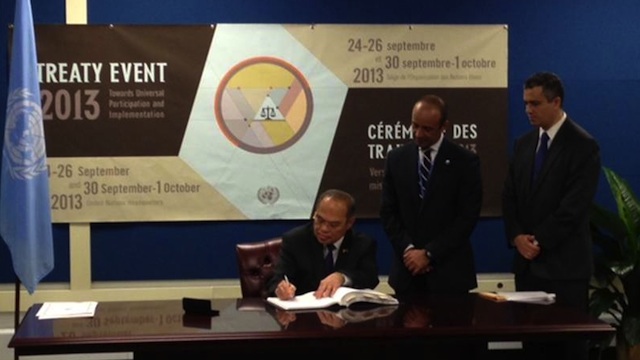SUMMARY
This is AI generated summarization, which may have errors. For context, always refer to the full article.

MANILA, Philippines – The Philippines is now a signatory to the global Arms Trade Treaty (ATT), which aims to control the sale and shipment of conventional weapons globally.
This makes the Philippines the only Southeast Asian country so far to have signed the document.
Signing it on behalf of the country was Ambassador Libran Cabactulan, the Philippines’ permanent representative to the United Nations at its headquarters in New York on Wednesday, September 25, the Department of Foreign Affairs (DFA) said.
The treaty establishes standards for the international trade of conventional weapons, ranging from those used by the military to small arms. It also aims to curb weapons shipments to extremists and conflict areas.
“It contains strong regulations, based on human rights and international humanitarian law, and provides a set of criteria in the export of conventional arms,” the DFA said.
“The Philippines signed the ATT to fulfill our country’s commitment to promoting international peace and security,” Cabactulan said in the DFA statement.
The ATT was opened for signatures last June 3, and will enter into force after 50 countries have ratified it, the DFA said. As of September 25, 108 states have signed, while 7 have ratified the agreement.
The DFA said the Philippines was an active participant in the 7-year deliberations on the treaty.
“The proliferation of conventional arms has contributed to violence and instability in many parts of the world including the Philippines and there is a need to address this serious concern,” Cabactulan added.
Seven years in the making
It was first presented to the UN General Assembly in 2006, and the treaty text was adopted through a UN General Assembly resolution on April 2 this year. The Philippines, along with 153 other countries, voted in favor of it.
Only 3 nations – Iran, North Korea, and Syria – voted against the treaty. Twenty-three others abstained, including major players China, India, and Russia.
Russia, which along with Iran is the chief supporter of Syria’s embattled President Bashar al-Assad, said that the treaty was too vague and could be used for political ends.
The treaty requires states to prohibit shipments of weapons that could be used in human rights violations, including “attacks directed against civilian objects.”
The United States, the world’s largest exporter of conventional arms, accounting for 30% of the $90-billion global industry, signed it on Wednesday. US Secretary of State John Kerry signed it on behalf of the country.
Italy, the world’s eighth largest arms exporter, on Wednesday became the fifth UN member and the first European Union nation to vote to ratify the treaty. – With reports from the Agence France-Presse/Rappler.com
Add a comment
How does this make you feel?
There are no comments yet. Add your comment to start the conversation.